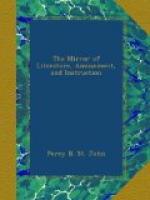It was ere daybreak of the first of January, 1477, a period long memorable for the events which marked it, that the Earl of Oxford, Colvin, and the young Englishman, followed only by Thiebault and two other servants, commenced their rounds of the Duke of Burgundy’s encampment. For the greater part of their progress, they found sentinels and guards all on the alert and at their posts. It was a bitter morning. The ground was partly covered with snow—that snow had been partly melted by a thaw, which had prevailed for two days, and partly congealed into ice by a bitter frost, which had commenced the preceding evening, and still continued. A more dreary scene could scarcely be witnessed.
* * * * *
A broad red glare rising behind the assailants, and putting to shame the pallid lights of the winter morning, first recalled Arthur to a sense of his condition. The camp was on fire in his rear, and resounded with all the various shouts of conquest and terror that are heard in a town which is stormed. Starting to his feet, he looked around him for his father. He lay near him senseless, as were the gunners, whose condition prevented their attempting an escape. Having opened his father’s casque, he was rejoiced to see him give symptoms of reanimation.
* * * * *
They looked back more than once on the camp, now one great scene of conflagration, by whose red and glaring light they could discover on the ground the traces of Charles’s retreat. About three miles from the scene of their defeat, the sound of which they still heard, mingled with the bells of Nancy, which were ringing in triumph, they reached an half-frozen swamp, round which lay several dead bodies. The most conspicuous was that of Charles of Burgundy, once the possessor of such unlimited power—such unbounded wealth. He was partly stripped and plundered, as were those who lay round him. His body was pierced with several wounds, inflicted by various weapons. His sword was still in his hand, and the singular ferocity which was wont to animate his features in battle, still dwelt on his stiffened countenance. Close behind him, as if they had fallen in the act of mutual fight, lay the corpse of Count Albert of Geierstein; and that of Ital Schreckenwald, the faithful though unscrupulous follower of the latter, lay not far distant. Both were in the dress of the men-at-arms composing the Duke’s guard, a disguise probably assumed to execute the fatal commission of the Secret Tribunal. It is supposed that a party of the traitor Campo-Basso’s men had been engaged in the skirmish in which the Duke fell, for six or seven of them, and about the same number of the Duke’s guards, were found near the spot.
[Previous to the battle of Nancy, Rudolf falls by the hand of Arthur:]
A pursuivant brought greetings from the family of the Biedermans to their friend Arthur, and a separate letter addressed to the same person, of which the contents ran thus:—




